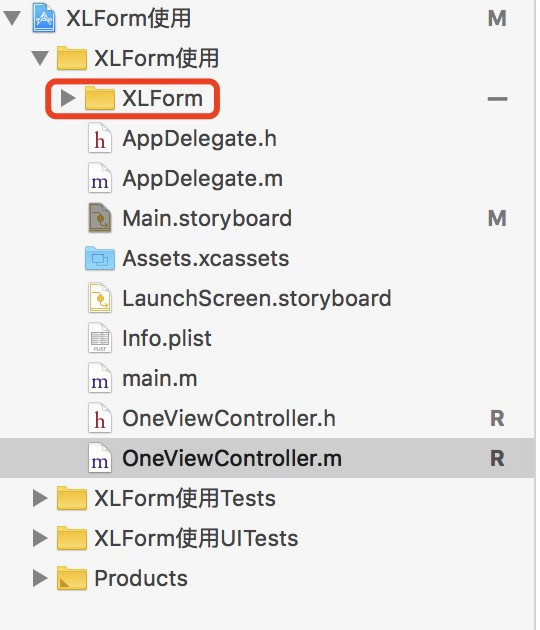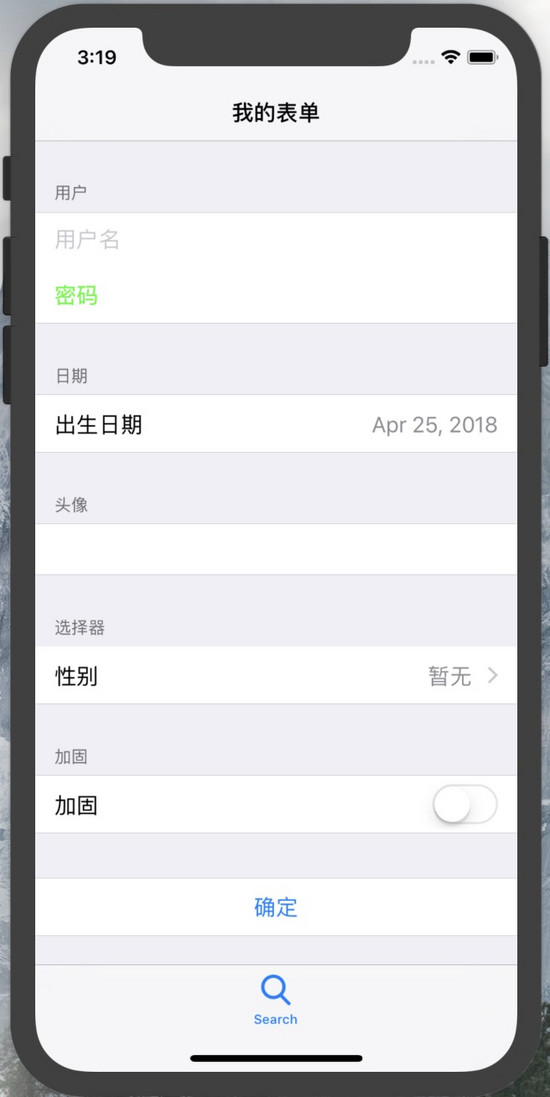您好,登錄后才能下訂單哦!
您好,登錄后才能下訂單哦!
本篇文章給大家分享的是有關XLForm怎么在iOS中使用,小編覺得挺實用的,因此分享給大家學習,希望大家閱讀完這篇文章后可以有所收獲,話不多說,跟著小編一起來看看吧。
一、 導入項目
使用CocoaPods或者手動導入庫文件,本人選擇直接導入項目源文件的方式。

導入項目.png
二、改造表單ViewController
讓ViewController繼承自XLFormViewController,并重寫下面的兩個方法
@interface OneViewController : XLFormViewController
@end
@implementation OneViewController
- (instancetype)initWithNibName:(NSString *)nibNameOrNil bundle:(NSBundle *)nibBundleOrNil {
self = [super initWithNibName:nibNameOrNil bundle:nibBundleOrNil];
if (self){
[self initializeForm];
}
return self;
}
- (id)initWithCoder:(NSCoder *)aDecoder {
self = [super initWithCoder:aDecoder];
if (self){
[self initializeForm];
}
return self;
}
@end三、構造表單
- (void)initializeForm {
// 設置是否顯示Cell之間分界線
//self.tableView.separatorStyle = UITableViewCellSeparatorStyleNone;
// 設置Section的高度
self.tableView.sectionHeaderHeight = 30;
XLFormDescriptor * form;//form,一個表單只有一個
XLFormSectionDescriptor * section;//section,一個表單可能有多個
XLFormRowDescriptor * row; //row,每個section可能有多個row
// Form
form = [XLFormDescriptor formDescriptor];
// First section
section = [XLFormSectionDescriptor formSection];
section.title = @"用戶";
[form addFormSection:section];
// 普通文本
row = [XLFormRowDescriptor formRowDescriptorWithTag:@"username" rowType:XLFormRowDescriptorTypeText];
// 設置placeholder
[row.cellConfig setObject:@"用戶名" forKey:@"textField.placeholder"];
// 設置文本顏色
[row.cellConfig setObject:[UIColor redColor] forKey:@"textField.textColor"];
[section addFormRow:row];
// 密碼
row = [XLFormRowDescriptor formRowDescriptorWithTag:@"password" rowType:XLFormRowDescriptorTypePassword];
// 設置placeholder的顏色
NSAttributedString *attrString = [[NSAttributedString alloc] initWithString:@"密碼" attributes:
@{NSForegroundColorAttributeName:[UIColor greenColor],
}];
[row.cellConfig setObject:attrString forKey:@"textField.attributedPlaceholder"];
[section addFormRow:row];
// Second Section
section = [XLFormSectionDescriptor formSection];
section.title = @"日期";
[form addFormSection:section];
// 日期選擇器
row = [XLFormRowDescriptor formRowDescriptorWithTag:@"birthday" rowType:XLFormRowDescriptorTypeDate title:@"出生日期"];
row.value = [NSDate dateWithTimeIntervalSinceNow:60*60*24];
[section addFormRow:row];
// Third Section
section = [XLFormSectionDescriptor formSection];
section.title = @"頭像";
[form addFormSection:section];
// 圖片選擇
row = [XLFormRowDescriptor formRowDescriptorWithTag:@"userpic" rowType:XLFormRowDescriptorTypeImage];
[section addFormRow:row];
// Fourth Section
section = [XLFormSectionDescriptor formSection];
section.title = @"選擇器";
[form addFormSection:section];
// 選擇器
row = [XLFormRowDescriptor formRowDescriptorWithTag:@"sex" rowType:XLFormRowDescriptorTypeSelectorPush];
row.noValueDisplayText = @"暫無";
row.selectorTitle = @"性別選擇";
row.selectorOptions = @[@"男",@"女",@"其他"];
row.title = @"性別";
[row.cellConfigForSelector setObject:[UIColor redColor] forKey:@"textLabel.textColor"];
[row.cellConfigForSelector setObject:[UIColor greenColor] forKey:@"detailTextLabel.textColor"];
[section addFormRow:row];
// Fifth Section
section = [XLFormSectionDescriptor formSection];
section.title = @"加固";
[form addFormSection:section];
// 開關
row = [XLFormRowDescriptor formRowDescriptorWithTag:@"enforce" rowType:XLFormRowDescriptorTypeBooleanSwitch title:@"加固"];
[section addFormRow:row];
// Sixth Section
section = [XLFormSectionDescriptor formSection];
[form addFormSection:section];
// 按鈕
row = [XLFormRowDescriptor formRowDescriptorWithTag:@"conform" rowType:XLFormRowDescriptorTypeButton];
row.title = @"確定";
[section addFormRow:row];
self.form = form;
}
-(void)didSelectFormRow:(XLFormRowDescriptor *)formRow{
// 判斷是不是點擊了確定按鈕
if([formRow.tag isEqualToString:@"conform"] && formRow.rowType == XLFormRowDescriptorTypeButton){
//獲取表單所有到的值
NSDictionary *values = [self formValues];
NSLog(@"%@", values);
}
[super didSelectFormRow:formRow];
}
//重寫改該方法 上面的方法就不會調用了
//-(void)tableView:(UITableView *)tableView didSelectRowAtIndexPath:(NSIndexPath *)indexPath{
//
// NSLog(@"%s", __func__);
//
//}
@end四、效果圖

效果圖.png
五、總結
前面兩步是官方文檔中可以找到的,也很簡單,關鍵在于initializeForm方法中具體構造表單的過程,這里有必要強調幾點:
1.XLFormViewController實現了UITableViewDataSource, UITableViewDelegate,并且持有一個UITableView,這個從該類的聲明可以看出來,所以UITableView 、UITableViewDataSource, UITableViewDelegate中的方法都可以正常使用。
復制代碼 代碼如下:
@interface XLFormViewController : UIViewController<UITableViewDataSource, UITableViewDelegate, XLFormDescriptorDelegate, UITextFieldDelegate, UITextViewDelegate, XLFormViewControllerDelegate>
2.XLForm將表單抽象為Form,Section,Row三個層次,分別對應三個類
XLFormDescriptor * form;//form,一個表單只有一個 XLFormSectionDescriptor * section;//section,一個表單可能有多個 XLFormRowDescriptor * row; //row,每個section可能有多個row
3.每個表單中的具體信息最后都落腳到XLFormRowDescriptor中,通過它可以配置不同樣式的表單項,通過構造函數的rowType指定具體的表單類型,該框架提供了非常豐富的rowType,具體可以參考官方文檔說明。
4.更細化配置表單項就需要借助于XLFormRowDescriptor中的屬性進行配置,常用的有
@property (nonatomic, readonly, nonnull) NSMutableDictionary * cellConfig; @property (nonatomic, readonly, nonnull) NSMutableDictionary * cellConfigForSelector;
這個配置的時候,往往有同學不知道具體如何才能設置屬性,比如怎么設置表單輸入框的placeholder?更進一步如何設置placeholder 的顏色。其實它用到了KVC,因為它們兩個都是UITextField類中的屬性,那么直接進入UITextField查找,發現如下信息:
@property(nullable, nonatomic,copy) NSString *placeholder; @property(nullable, nonatomic,copy) NSAttributedString *attributedPlaceholder NS_AVAILABLE_IOS(6_0);
那么設置起來就是
[row.cellConfig setObject:@"用戶名" forKey:@"textField.placeholder"]; [row.cellConfig setObject:attrString forKey:@"textField.attributedPlaceholder"];
注意這里的key的寫法,就是KVC的寫法。其他的屬性依此類推。
5.如何獲取設置好的表單的值?其實非常簡單,該框架提供一個方法formValues,它的返回類型是一個NSDictionary,其中key就是XLFormRowDescriptor設置時的Tag。可以直接在控制器中調用該方法獲取表單值,上面的效果圖設置后的表單信息如下:

以上就是XLForm怎么在iOS中使用,小編相信有部分知識點可能是我們日常工作會見到或用到的。希望你能通過這篇文章學到更多知識。更多詳情敬請關注億速云行業資訊頻道。
免責聲明:本站發布的內容(圖片、視頻和文字)以原創、轉載和分享為主,文章觀點不代表本網站立場,如果涉及侵權請聯系站長郵箱:is@yisu.com進行舉報,并提供相關證據,一經查實,將立刻刪除涉嫌侵權內容。